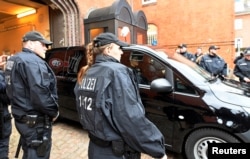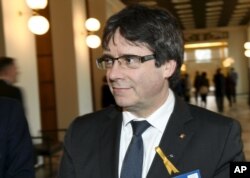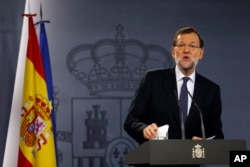A German court said on Monday it was likely to take several days to decide whether to extradite former Catalan president Carles Puigdemont to Spain to face rebellion charges over the region's campaign for independence.
But despite a night of protests across Catalonia in which dozens of people were hurt in clashes with police, Puigdemont's arrest Sunday in northern Germany leaves the independence movement weaker than it has been in years. Almost its entire leadership is now either behind bars ahead of trial or in exile.
Puigdemont, who fled Spain five months ago for Belgium after Spanish Prime Minister Mariano Rajoy dismissed his regional administration and imposed direct rule from Madrid, faces charges of rebellion that could lead to 25 years in prison.
On Sunday night, a demonstration in Barcelona against Puigdemont's arrest by tens of thousands of Catalans tipped over into clashes with police.
Outside the central government offices, riot police beat flag-waving protesters back with batons, leaving several with blood streaming down their foreheads.
About 100 people were hurt across the region, including 23 members of the Mossos d'Escuadra police force, and nine people were arrested, authorities said.
The protests followed a Spanish Supreme Court ruling Friday that 25 Catalan leaders, including Puigdemont, would be tried for rebellion, embezzlement or disobeying the state relating to a referendum held in Catalonia last October that called for it to separate from Spain.
The Madrid government deemed the referendum, which was widely boycotted by opponents of independence, illegal and took over direct rule of the wealthy northeastern region following a symbolic declaration of independence by the Catalan parliament.
Reactivated warrants
The court on Friday also reactivated international arrest warrants for four other politicians who went into self-imposed exile last year. Puigdemont and fellow separatists have all denied any wrongdoing.
Five separatist leaders, including the latest candidate to become regional president, Jordi Turull, were ordered jailed pending their trial. The Catalan parliament's failure last week to vote in Turull as president started a two-month countdown to elect a new leader before a regional election is triggered.
The forceful action by the government and courts appeared to be bringing a close to what had been one of Spain's worst political crises since the return of democracy in the 1970s.
"Looks like the separatist movement is falling apart," Kepler Cheuvreux analyst Adrian Zunzunegui said in a note Monday. "We expect a few more months of uncertainty, and most likely new elections to be called then."
Another election could swing the government either way, with separatist sympathies still simmering across Catalonia, though polls have shown support sharply down in recent months.
On Monday, the Catalan parliament, where pro-independence parties hold a majority, called a session for Wednesday in support of Puigdemont.
The proposal includes a debate over Puigdemont's right to be invested as regional head of the Catalan government. Spain's Constitutional Court has already said he could only become regional leader if he was physically present in the parliament and had a judge's permission to attend.
Puigdemont appeared on Monday before a regional court in the northern German town of Neumuenster, which extended his detention pending a decision on extradition.
Another court, the Higher Regional Court in the town of Schleswig, will be responsible for deciding whether to grant Spain's request. The court is unlikely to make a final decision on Puigdemont's extradition before Easter, a spokeswoman for the state prosecutor said.
Puigdemont, who has been living in Brussels since leaving Spain, does not plan to apply for political asylum in Germany, his lawyer Jaume Alonso-Cuevillas told Catalan radio.
He had entered Germany from Denmark on Friday after leaving Finland, where he had attended a conference and was caught off-guard by the Spanish Supreme Court's unexpected decision to reactivate his arrest warrant.
Leaning toward Spain
The 55-year-old former journalist is unlikely to find much support among German politicians who have largely backed Spanish Prime Minister Mariano Rajoy's crackdown on Catalan separatism.
A German government spokesman said on Monday the case was being handled according to German laws and European arrest warrant provisions, and that the Catalan question could only be resolved within the framework of Spanish law.
Elmar Brok, a German member of the European Parliament and ally of Chancellor Angela Merkel, said Puigdemont had "clearly violated Spanish law and the Spanish constitution."
European governments, some of whom face separatist movements of their own, have generally been supportive of the Spanish government.
The Scottish government, which advocates independence from the United Kingdom, said it would co-operate with Madrid over a request to extradite former Catalan education minister Clara Ponsati, although it still believed Catalans had the right to self-determination.
Ponsati's lawyer said Monday she would contest her extradition and called it "political persecution."
The drawn-out crisis has also hit Catalonia's economy and caused a business flight. But rating agency Standard & Poor's last Friday upgraded its rating for Spain, reflecting a positive outlook for the economy and limited impact from Catalonia.
Spanish bond yields were at close to 15-month lows Monday morning.









